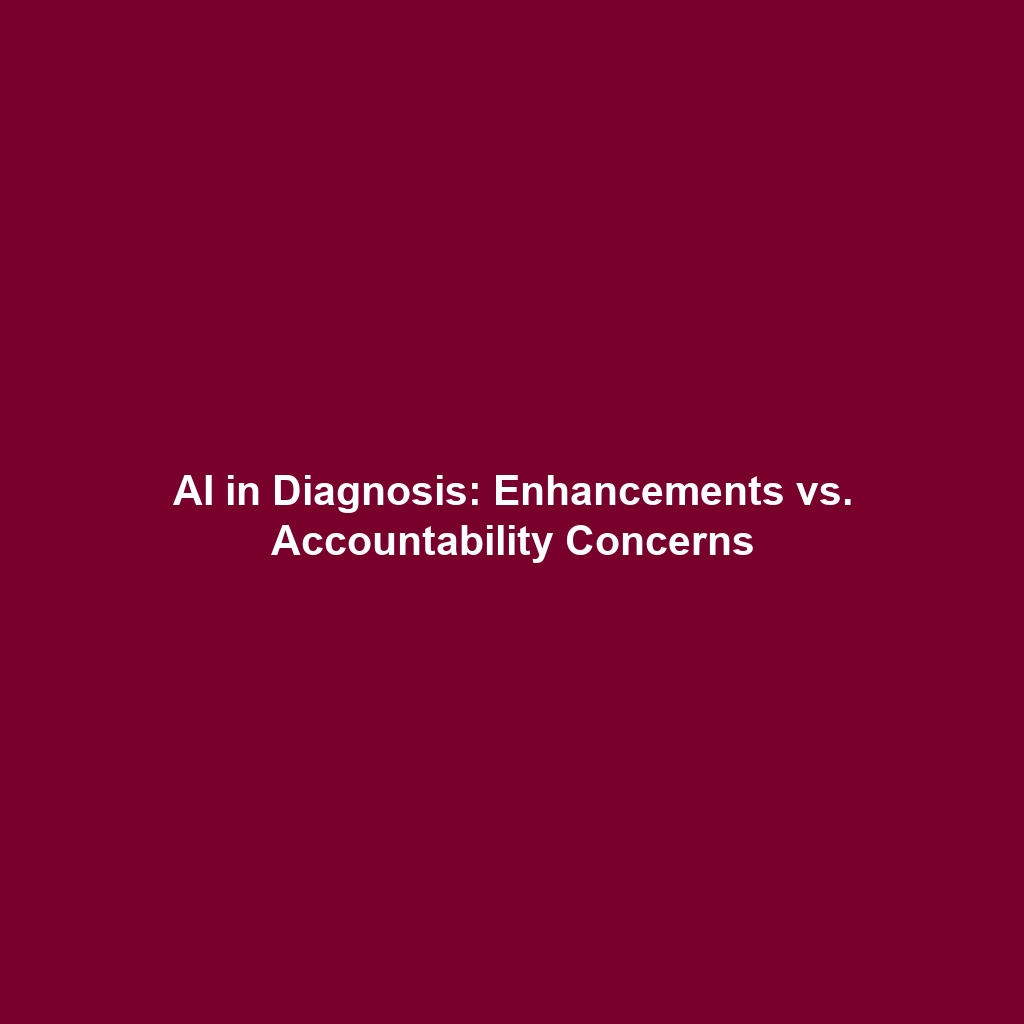How AI Improves Diagnosis but Raises Concerns about Accountability in Case of Errors
The integration of Artificial Intelligence (AI) into healthcare has revolutionized diagnostic processes, leading to faster and more accurate patient assessments. However, this advancement prompts critical questions regarding accountability when errors occur. Understanding how AI technologies balance the benefits of enhanced diagnostic capabilities with ethical considerations is crucial for stakeholders in the health sector. This article explores the intersection of AI diagnosis and accountability, shedding light on significant ethical concerns within the broader realm of AI Ethics.
Key Concepts in AI Ethics
AI Ethics encompasses a range of principles that guide the development and deployment of artificial intelligence systems. When addressing the topic of how AI improves diagnosis but raises concerns about accountability in case of errors, several key concepts emerge:
- Transparency: The algorithms and decision-making processes behind AI systems must be clear and understandable to both healthcare providers and patients.
- Accountability: In the event of a diagnostic error caused by AI, it is essential to determine who is liable—the healthcare provider, the AI developers, or the institution using the technology.
- Bias and Fairness: AI systems may perpetuate existing biases in healthcare data, leading to unequal treatment and outcomes for different patient groups.
Applications and Real-World Uses
AI systems are being employed in various medical fields to enhance diagnostic accuracy:
- Radiology: AI algorithms are utilized to analyze medical imaging, improving the detection of conditions such as cancer and reducing false positives.
- Pathology: Machine learning tools assist pathologists in identifying disease markers in tissue samples, increasing diagnostic precision.
- Predictive Analytics: AI tools predict patient outcomes based on historical data, enabling timely interventions.
These applications demonstrate how AI is used in healthcare to improve diagnosis while simultaneously raising accountability concerns that necessitate careful ethical consideration.
Current Challenges
The implementation of AI in healthcare diagnostics faces several challenges:
- Data Quality: High-quality, comprehensive datasets are essential for training effective AI models, yet many healthcare facilities struggle with data standardization.
- Legal and Ethical Standards: Current regulations surrounding AI deployment in healthcare are often outpaced by technological advancements, leading to legal ambiguities.
- Trust Issues: Patients and practitioners may be hesitant to trust AI-based diagnostics, particularly in the face of potential errors.
Future Research and Innovations
As AI technology evolves, several innovations are on the horizon:
- Explainable AI: Future research focuses on developing AI models that can provide explanations for their diagnostic decisions, thereby increasing transparency and trust.
- Enhanced Collaboration: New models will promote collaboration between AI systems and healthcare professionals, ensuring that human oversight remains integral to the diagnostic process.
- Addressing Bias: Ongoing research seeks to identify and mitigate biases in AI systems, leading to fairer diagnostic outcomes across diverse populations.
Conclusion
In summary, while AI plays a transformative role in enhancing diagnostic accuracy, the ethical implications of accountability in case of errors cannot be overlooked. As healthcare continues to innovate with AI technologies, it is vital for stakeholders to engage in ongoing discussions surrounding transparency, accountability, and fairness in the application of these tools. For more insights on AI Ethics and its implications in healthcare, consider exploring our additional resources on AI Responsibility and Ethical AI in Medicine.
